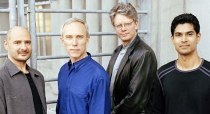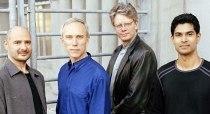
Both Ghost Opera and the West Coast premiere of A Chinese Home also feature Wu Man, an expatriate virtuoso on the pipa, a Chinese lute, whose introduction to Harrington in 1992 “reminded me of hearing Jascha Heifetz for the first time.” Shortly after that meeting, the Chinese composer Tan Dun, recognizing Kronos’ gift of theatricality (during their staged performance of George Crumb’s Black Angels), began writing Ghost Opera for the Quartet and Wu Man.
Strolling through downtown San Francisco, Harrington and Tan Dun found themselves thinking about “the past, the present, and the future, and the way they can superimpose themselves on music and performances.” Ghost Opera came to include musical and verbal quotations from Shakespeare and from Bach, as well as a variety of Chinese instruments aside from the pipa, some of them involving the manipulation of paper, stones, or water. The work, which also has the instrumentalists vocalizing, facilitates an examination of spirituality within various cultural contexts.
Kronos continued collaborating with Wu Man through the 1990s and into the next decade, and in 2006 she joined Harrington on a visit to Yin Yu Tang, an 18th-century residence from southeastern China that had been relocated to Salem, Mass. This sourced the title and content of A Chinese Home. “I began to try to imagine all the things these walls and objects had heard or been exposed to,” says Harrington. To bring order to what loomed as a massive project, Harrington and Wu Man elicited the collaboration of Chen Shi-Zheng, a director of stage, film, and opera.
No one of the three was named as composer, but Harrington wanted to also convey “the story of what it was like to grow up in China, as Wu Man and Chen Shi-Zheng have done.”
Harrington audited hundreds of hours of diverse folk and ritual music from China’s 22 provinces, from which came the selections in Part I of A Chinese Home, titled “Return.” Part II, called “Shanghai,” is basically film music, associated with that city’s bourgeoning movie industry and Westernization in the 1920s and ’30s. “It’s beautiful, like great cheese, and some of the best music is cheesy, let’s face it,” says Harrington. Part III, “The East Is Red,” evinces the transformation of a traditional theme into a musical touchstone of Mao Tse-Tung’s communist domination of China, and showcases other ideological but appealing compositions. Part IV, “Made in China,” moves past the Cultural Revolution’s era of government censorship into the present day, where Jonathan Wong’s electronic mashup of earlier sections of the piece is showcased alongside Wu Man’s shift to a sampling pipa (designed by Kronos instrument-builder Walter Kitundu) and a menagerie of acoustic toys.
Kronos will once again go beyond the standard string quartet instrumentation in this new piece, will make several costume changes, and will perform in front of projected images, some of them depicting Yin Yu Tang. Harrington has created a 30-minute recorded “soundtrack” to play during the intermission between Ghost Opera and A Chinese Home, which to careful listeners will reveal political elements, air checks from Tibetan radio, and a 115-year-old Edison cylinder recording of Chinese music. This all reflects what Harrington has learned from listening to the world, including China: “Things keep reappearing and sounds keep coming back. So nothing we do gets lost; it all comes back, in various forms.”

